The 19th century fin de siècle and its heady aftermath were fascinating years of intellectual and cultural ferment throughout Europe, with a burgeoning counter-culture that challenged and undermined established standards not only in the political arena, but also in the psychological, social, sexual and artistic spheres. While Oscar Wilde confronted the Victorian Establishment, along with those associated with the notorious Yellow Book, Joris-Karl Huysman wrote his seminal work Against Nature, Edgar and Francis Saltus wrote decadent fiction and poetry in the USA, and many others in Europe added their voices. The Czech lands were also seething with suppressed political, cultural and social aspirations that sought new forms of expression in “Decadence”, symbolism and the first stirrings of what was to become surrealism, as the Austro-Hungarian Empire remained unrelenting in its refusal to grant the Czechs autonomy to match their growing economic and political might.
This article will present several fairly random examples of the many hidden gems from this period, including writers of a European standard who have barely been translated or paid any attention at all in the English-speaking world. My selection will of necessity be rather idiosyncratic, but hopefully these authors will lead the curious reader on to other like-minded contemporaries both in Bohemia and beyond, opening up new vistas of this long-buried literary underground that promised so much…
Decadence covers a broad range of trends in late 19th century Europe. What had started off as a term of opprobrium to denigrate e.g. the individualism and subjectivism of the Romantics was embraced as a badge of honour by writers of all kinds, many of whom deliberately confronted the prevailing paradigms of progress and rationality with whatever came to hand from the flâneurs and dandies of the day pour épater les bourgeois. To quote Peter Butler in his analysis of late decadent Jan Opolský’s prose: “Where society valued sobriety and realism, the Decadents expressed a preference for imagination over reality, and for dandyism and aristocratic refinement over middle-class normality; where society valued bodily and mental well-being, the Decadents celebrated morbidity and neurosis; where society valued striving for material betterment, the Decadents were given to erethism and abulia.”
“Decadence” in Bohemia is best represented by the circle that formed around Moderní revue, a journal that presented Czech and French decadent work, established by Jiří Karásek ze Lvovic and Arnošt Procházka. Its first edition in the dystopian-sounding year 1894, met with much public indifference or even hostility. With a boldness that was shocking at the time the young decadents broke one taboo after another, delighting in presenting their individualistic views at a time when the shadow of the censor fell on every page. They turned their backs on society, sang the praises of sexual freedom and disdained conservative morality. This journal formed a centre of gravity for most of the up and coming literati, who were later to become the grand old men and women of Czech literature: Otokar Březina, S. K. Neumann, Karel Hlaváček, Viktor Dyk, Miloš Marten and Antonín Sova among many others. In Moderní revue a daring new type of literary output was promoted by Jiří Karásek, who contributed to a great extent himself with his own poetry, prose, drama and essays until it folded in 1925 under the new Czechoslovak state. He also contributed to other journals e.g. Vesna, Niva, Literární rozhledy, Rozpravy Aventina and Fronta, while editing occultist and spiritualist magazines e.g. Okultní a spiritistickou revue as well as bibliophile journals such as Český bibliofil.
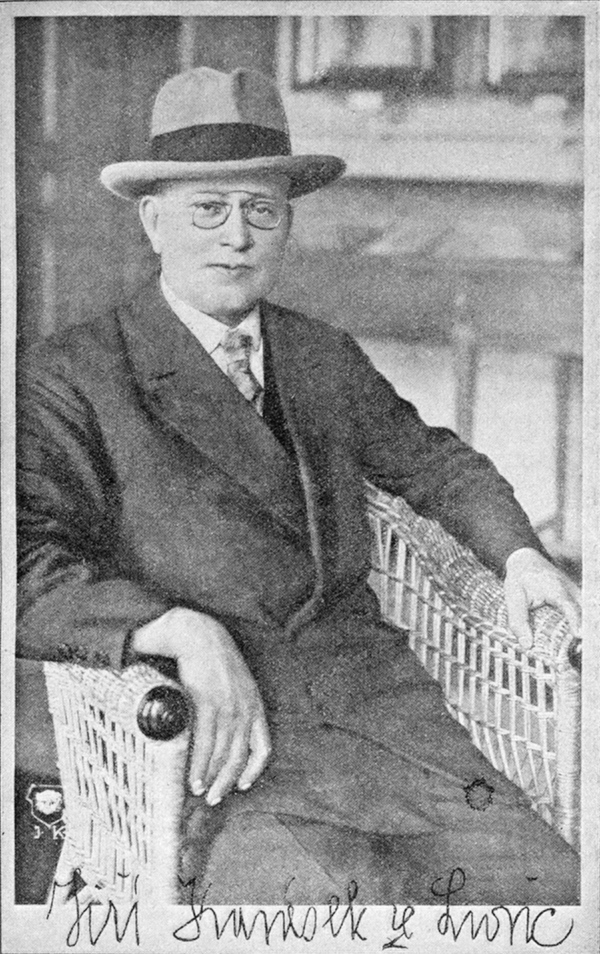
Jiří Karásek ze Lvovic, ca 1930.
Born into impoverished circumstances in Prague, Jiří Josef Karásek went to a local grammar school in Malá strana (made famous by Jan Neruda’s Malostranské povídky) and began studying theology in 1889, but never completed his course. Religion and spirituality remained a source of fascination in his works, paradoxically contrasting with his unflinching observation of the corporeal, earthy, darker and bleaker sides of life. His thought was also greatly influenced by Schopenhauer’s Buddhist-inspired philosophical resignation and Nietzsche’s individualistic superman.
While claiming to be the last scion of a noble family descended from a medieval astrologer, and adopting the aristocratic epithet “ze Lvovic”, perhaps inspired by Lyonnesse of Arthurian legend, he worked the night shift on the Brno to Prague express, sorting mail.
Adopting this aloof Nietzschean autostylization, he expressed his contempt for the society around him by focusing on extreme mental and emotional states, numinous, profane and a combination of the two. He showed a typical “Decadent” interest, in the words of Robert Pynsent, “in intermediate states”. Flouting the puritanism of his day he explored human sexuality in its many guises while paradoxically often gravitating towards a Catholic aesthetic, as his characters frequently find themselves in a twilight zone between religious ecstasy and erotic arousal, mysticism and masochism.
In addition to his prose works and critical essays defending individualism and philosophical detachment, Karásek also wrote poetry which expressed his disgust for the life around him and boldly declared his fascination for the homoerotic. One such collection discreetly entitled Sodoma was confiscated in 1895 for its “immoral” content. Undaunted, Karásek had it republished ten years later, this time having had the good fortune to see it read out in full before a somewhat astonished Reichsrat in Vienna by Social Democrat deputy Josef Hybeš, which automatically placed it beyond the grasp of the censor.
A Gothic Soul is one of the best known models of these decadent motifs in Czech literature. First published at the cusp of the new century in 1900, this novella came out in an excellent English translation by Kirsten Lodge in 2015.
The chief protagonist lives in a dreamworld between the drear labyrinth of his own soul, and its seeming murky reflection in the moribund Prague townscape of decaying palaces, gothic churches, haunted baroque monasteries and overgrown graveyards, seeking some sense to his life and salvation in God. His spiritual quest for himself is mirrored by his personal quest for a close friend and at the same time the seemingly doomed Czech quest for identity and autonomy. There is little plot, just a few fleeting encounters with like-minded souls amongst the ancient shadows of Prague. Introspection and introversion are taken to an extreme of morbid hypersensitivity, as he falls into a religious mania coloured by his sexuality and dies insane in an asylum. Many readers will surely find the bleakness of this novella to be dauntingly relentless, and indeed this is no light bedtime reading for those in a delicate mood. The futility of human existence is painted in grim detail as the novella sinks remorselessly into its ghastly finale. I quite enjoyed it.
In his preface the author describes his own work: “It has almost no plot. […] Rather than a plot, a series of stories and episodes, you will find the painting of a soul, uninterrupted by plot details, a continuous flow, a spiritual stream. […] My book is not a narrative; I have composed it from spiritual processes. Impression follows impression. Feeling gives way to feeling.” In many ways this approach presages the “psychological novel” of the early 20th century, in which (to quote Britannica) the thoughts, feelings, and motivations of the characters are of equal or greater interest than is the external action of the narrative. It is reminiscent of other psychological writing of the time, such as Knut Hamsun’s Hunger, recounting the adventures of a young man whose sense of reality is giving way to delusions.
Karásek’s literary philosophy is expressed succinctly in his preface:
“To say that art should represent the world as it really is would be to assert that the purpose of art is to imitate those things that do not interest us even in reality.” […] “Fiction is eternal; reality perishes. Invented forms live; real ones vanish. Truth is ephemeral; illusion, everlasting. Passions and emotions experienced in real life never have the same force as invented passions and emotions: how many times is Hamlet’s melancholy revived in us, even though we will never again feel a sorrow once felt? The real thus becomes unreal.” […] “Where are the love and friendship we once felt? They did not last even a single lifetime. Those we once loved madly still live, yet now we pass them by with indifference, whereas Francesca da Rimini and Paolo never cease loving one another, perhaps because their love was never so passionate in reality.”
Hence we are afforded an inside view of his mental degeneration: “The ticking of a clock would become the voice of a man telling him in the diffuse light of dusk about furtive intrigues.” […] “Everything dead came alive for him, while everything alive died before entering his soul. In a heavy, fantastically carved wardrobe he suddenly saw the doors of an enormous hall, which opened in his mind’s eye.” […] “The protruding stones of the corridor turned into tombstones in his mind.”
Intertwined with his search for personal identity and meaning is the quest for Czech national identity and autonomy: “The odyssey of the Czech soul. Her errant paths, her debilitating efforts to attain not power, but truth… That was her history before catastrophe struck. Bent over a Bible in a solitary cottage, she sat by a timid lamp and humbly waited for the instructions of truth, for its revelation.” […] “Waiting that was her symbol.” […] “The more the Czech nation and Czechness itself lost its contours in his thoughts, and the more everything became legendary, the more glorious that unfulfilled mission appeared to him.”
His feelings for the Czech nation are as fraught and ambivalent as his own spiritual quest: “The profound mysticism this people exuded! Hus – no, he was more a theologian. But Chelčický! And Comenius! What depth! What a sea! And this people had died out, not exhausted from luxuriating in debauchery like other nations, but from the struggle to find the truth.” […] “Nihilism, yes, nihilism is the only philosophy possible for this people. Nihilism, the morality of the slave, the philosophy of pariahs. Whereas pride and aggression seethe in the blood of other nations, the one prevailing emotion in this degenerate race: cowardice, and with it an absolute distrust of everything, life above all…”
This quest for truth is mirrored in his quest for a lover. He is seeking a passionate friendship that consists in “the union of two bodies as well as the union of two souls”, but all he finds is chance transient encounters in the streets: “They looked at one another instinctively, as if something had immediately drawn them to one another.” […] “Someone smiles, he smiles back, without even knowing why. Someone says: come with me, and he goes, and does not even know why or where he is going. That’s all. And that’s life.” […] “At once he looked into the stranger’s eyes. He had never seen such eyes before. In the darkness their green hue turned into a soft, indolent, yellowish amber shade, as though burning with warmth, which seemed to absorb and imbibe the darkness. Those eyes, which enticed him while regarding him with ironz, opened wide and then partlz closed, as though first with sharpened attention, then in utter apathy. He felt an uneasy fondness for the stranger and yearned to solve the enigma of his mysteriousness…”
Chastely, the focus shifts away from the stranger towards the evening bells ringing out over Prague. All his concerns come together at this juncture. “He felt as though the long dead were speaking through the bells. At that instant it seemed to him the immense multitude of the invisible dead was coming back to life and filling the city streets and entering the houses beneath their roofs.” […] They spoke of the bygone glory of this land, of its quarreling princes and enemies attacking the city walls.” Each of the famed church bells of Prague is described in detail as a crescendo is reached. “The sky turned red in an inundation of blood. A great phantasmagoria of burning churches and battered cloisters rose before his eyes. […] “Even the stranger had left.”
The best and the worst of the Czech nation is exemplified for Karásek in Petr Chelčický (c. 1390 – c. 1460), a quietist medieval author, who was subsequently to influence such pacifists as Tolstoy. Here we find another hidden gem of Czech literature. “Of course, Chelčický was a great genius. But he had left his own time behind and transcended it so far into the future that even today he was still not fully appreciated.” […] He condemned all “power by the sword”. all spilling of blood both in war and in executions — and moreover, his ideas would still be relevant today, hardly anachronistic. Yet he also condemned all authority of man over man: offices, town councilors, district administrators and kings. He denied judicial legitimacy and disdained the court oath.” […] “He was a great and absolute nihilist. He was a typical Czech, because we all work toward nihilism. Nobody knows how to contest everything so grandly as a Czech, and Chelčický was so perfect at it.” […] “To do nothing was the foundation of all wisdom. That was spoken to us from the soul. And this was why Chelčický was the greatest Czech philosopher.”
This ambivalence over nihilism and nothingness, mirroring his overall psychological ambivalence, embraces both a Schopenhauerian resignation as in Chelčický’s dictum above, and we clearly hear resounding Nietzschean language in his derision of Christianity, as he loses his faith entirely. “You have denied life. You have preached mortification and asceticism. You have terrified the world with the gaunt faces of martyrs, instead of delighting it with a smile and cheerful faith.” […] “You said to us: blessed are the weak, the sick, the humble…You hated life and brought death to the world.” Hence like Nietzsche the protagonist seeks to go beyond good and evil, and in intertextual echoes of Des Esseintes’ Salomé, he finds a femme fatale figure in Mary Magdalene to lead him beyond. In “an atmosphere of thrilling vice”. […] “She had walked forward through all sin. She had experienced everything, had wrung from life all its pleasures. […] “Yes, it is necessary to love the world, to taste its pleasures. Only then does one arrive at God and virtue. One must first sin, and only afterward may one become a saint.”
But this way madness evidently lies. “The sun was setting, lusterless as a plaque covered in ash.” as the protagonist succumbs to his terminal religious mania, in which Christ is conflated with his fleeting lover. Hearing “a fanfare of all suppressed life and suppressed sexuality” […] “he feels […] the unifying pleasure-pain of Mary and Magdalene” […] the sinner embracing the dear heavenly Lover and hiding his face in waves of luxuriant hair, unbound and saturated with ointments.”
In the translator’s afterword, Kirsten Lodge explains: “Because the chief representative of Czech Decadence, following Oscar Wilde, openly expresses his same-sex desires and incorporates them into the framework of Decadence, homosexuality is not merely alluded to – as in Against Nature – it is a crucial element of the Czech movement.” When Oscar Wilde was imprisoned for two years for “immorality”, most of the European press condemned him, but Moderní revue was one of the few periodicals to stand by him. Moreover, in June 1895 a “sensational” issue of Moderní revue dealt not only with Oscar Wilde’s trial, but also with the phenomenon of homosexuality in general, which was practically unprecedented at that time.
Remarkably, during the 1930s he sat on the editorial board of a unique fortnightly periodical for the homosexual community in Czechoslovakia, which first came out fortnightly in May 1931 as Hlas sexuální menšiny (Voice of the Sexual Minority). This folded a year later, but reappeared as a monthly entitled Nový hlas (New Voice) with the subheading List pro sexuální reformu (Journal for Sexual Reform), which had a print-run of several hundred copies until 1934. While it subsequently faltered several times, the surviving copies provide a remarkable insight into gay life at that time. Like its German prototype Der Eigene, which had been closed down in 1932 due to Nazi pressure, Hlas and Nový hlas offered a variety of articles, poems, short stories and feuilletons on the literary, historical and medical aspects of homosexuality, as well as a lonely hearts column. When Karásek won the State Prize for Literature, Hlas published a special issue in December 1931 devoted to his life and work.
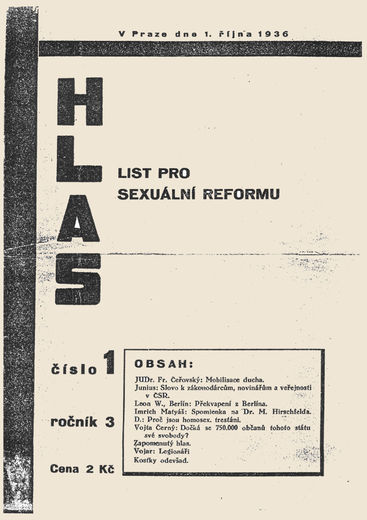
The front page of an issue of Hlas published in 1936. Source: queerpamet.cz.
Karasek’s other works are by no means all so grim. The short stories in Posvátné ohně, for example, present colourful mythological tales of religious and erotic ecstasy against exotic backgrounds depicted in painterly detail. In 1938 Karásek published his autobiographical novel Ztracený ráj, in which he describes his childhood and youth in Prague at the turn of the century in similar exquisite detail with no holds barred. This has been described as an archetypal “coming out” novel. Some of his novels are now also considered to be science-fiction and fantasy. He was interested in occultism and was a member of the Czech society of hermetics called “Hermetik Universalia”, which also had an influence on his fiction. The occult element in Romány tří mágů comprising Román Manfreda Mcmillena (1907), Scarabeus (1908) and Ganymedes (1925) was in his own words inspired by his mysterious friend in Vienna, whose dandyism was evidently another source of inspiration, as were the romanettos of fantasy and science fiction writer Jakub Arbes, who deserves an article all of his own. This interest in gothic mystery, magic and the occult finds a myriad reflections in Czech literature, e.g. in the work of Miloš Urban. See also Angelo Maria Rippellino’s Magická Praha and Peter Demetz’s Prague in Black and Gold, which explores 19th century Anglophone and Germanophone fiction set in magic Prague, ranging from George Macdonald’s Phantastes to George Eliot’s The Lifted Veil (she spent a day here) to Francis Mario Crawford’s The Witch of Prague.
Karásek was also an art connoisseur and his collection of modern paintings was one of the largest in Europe. It was later nationalized and exhibited in Czech museums.
He was a well-known man about town in Prague for several decades. My literature tutor at SSEES Karel Brušák recalled from many years back this refined, dignified character with immaculate manners in a bright ginger toupée. He outlived democracy and died in obscurity under Stalinism.
His literary legacy is never-ending. Apart from the modern Czech “Neo-Decadents” there are numerous modern authors who hail Karásek ze Lvovic as a founding father of gay Czech literature. The definitive volume on this topic Homosexualita v dějinách české kultury has an English-language summary by Martin C. Putna at the back, which gives some idea of the broad spectrum of novelists, dramatists and film-makers involved.
A note on the translation. Some translators will readily adapt the structure of a work to English-language genre conventions, reformulating and restructuring willy-nilly, and while I am not necessarily criticizing this fine art, I fear the flavour of the original would have been very much lost in any attempt of that kind here. Mercifully, I found that Kirsten Lodge respected the Czechness of the basic narrative. I learnt a lot from this translation, and an analysis of some of the techniques used can be found in this thread on Czechlist.
The hardback book published by Twisted Spoon is a fine artefact with a set of six fin de siècle wood engravings by Sascha Schneider selected from an album published by J. J. Weber in Leipzig in 1896.
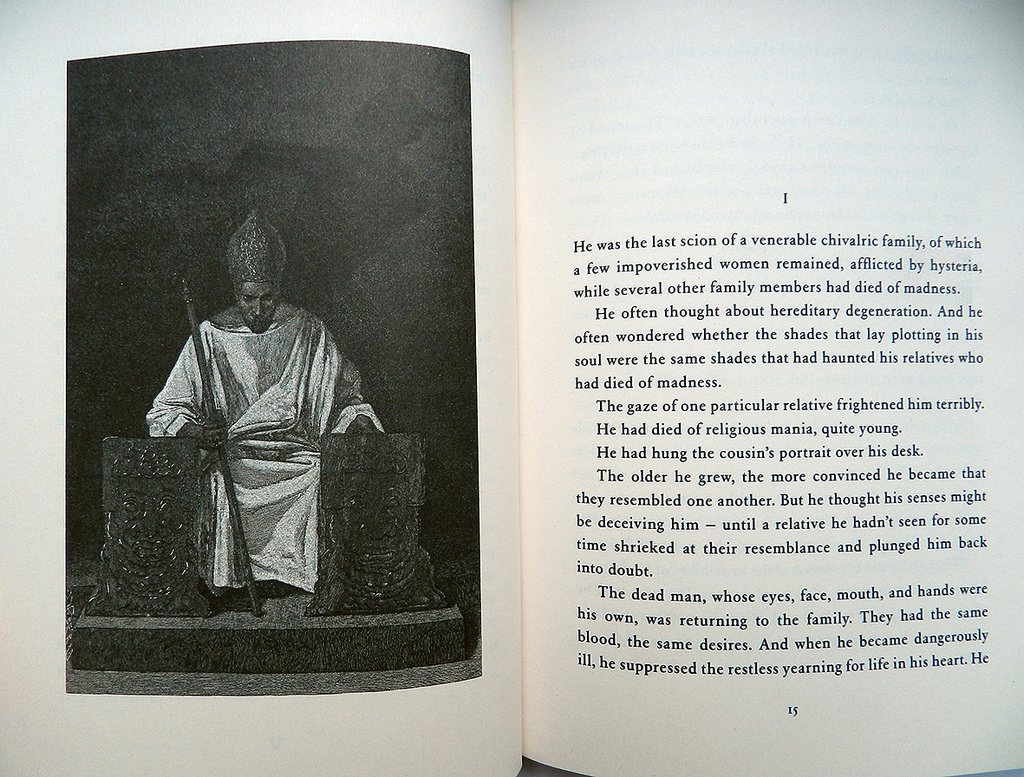
A two page spread from ‘A Gothic Soul’ showing one of the wood engravings. Source: Twisted Spoon Press Flickr page.
The influence of Nietzsche and Schopenhauer can also be felt strongly in the work of other writers of this period, and perhaps none more so than philosopher and novelist Ladislav Klíma (1878-1928), who combines their ideas in a unique way to come up with his very own potent home-brewed philosophy.
Like Karásek he was something of an outsider from an early age. In his autobiography Klíma describes his disgust for all intimacy and contempt for everybody including his siblings, who all died young. What started with petty theft and vandalism ended with a ban from every school in the Austrian Empire for calling the Habsburgs unspeakable names. His adult life was no less intemperate, living from hand to mouth on odd jobs such as shoe-shining and doomed get-rich schemes such as selling tobacco substitute, or living off occasional royalties and friends. As Karel Čapek commented: “Next to Klíma, Diogenes in his barrel was a homeowner.”
In addition to Nietzsche and Schopenhauer, he was also strongly influenced by Berkeley’s idealism and the symbolist mysticism of his friend Otokar Březina (who in turn influenced an entire generation of artists, see the English translation of his Skryté dějiny, Hidden History by Carleton Bulkin). Hence we see in his work a heady mix of radical idealism and subjectivism in which all reality becomes his plaything as he takes Schopenhauer’s opening sentence in Die Welt als Wille und Vorstellung – “The World is my idea/representation” (Vorstellung) – to an extreme conclusion in his Svět jako vědomí a nic – The World as Consciousness and Nothing (1904) in a metaphysical system of egosolism and egodeism in which he identifies his ego with divinity.
The central idea in all this is the Will. In Schopenhauer’s way of looking at things, ‘Will’ is Kant’s noumenon, which motivates all phenomena, where motivation is but causation seen from within. The Will is a blind, amoral force, forever driving each phenomenon to seek fleeting gratification by coveting the time, space and energy of every other phenomenon, hence the gay panoply of life is merely the same pattern repeating kalaidescopically and the resultant suffering inherent in life can only be ended, Buddhist fashion, by detachment from this Will. Schopenhauer was at pains to point out that he only chose this word for his thing-in-itself because humans are most familiar with it in those terms, not because he was ascribing any kind of voluntarism to inanimate objects. Hence many critics point out the inappropriacy of the term. But it is as if he has thereby imaginatively answered the old question ‘Does man have free will?’ with leaden Teutonic wit: No, quite the reverse.
After first idolizing Schopenhauer, Nietzsche reacted against this idea. For him the Will was not to be abnegated, but embraced, as the life-enhancing will to power. Renunciation is despised as weakness, and strength and power become values in themselves.
Klíma took on both approaches and cultivated his will while denying it. ‘Strength leads to victory, but weakness no less’. Both strength and weakness were values for him, and in his work we see the interplay of the two poles as he finds pleasingly congruent and incongruent patterns between the two.
Appealingly, Klíma does not explore these ideas so much in lengthy rationales as in trenchant aphorisms and poetic sloganization, addressing the emotions and passions of which he speaks, rather than the intellect. In this way he experimentally turns idealist philosophy into forays into the creative imagination, exploring new aesthetic and moral realms. Here is just a small random selection:
Subtlety is only of value if it is accompanied by sublimity. Love is a stratagem of the tyrannical urge. Every question is a command. No one has enslaved the nations so much as their ‘liberators’. You can rarely think as highly of yourself as does your greatest enemy. A compliment is a bloody insult. Truth that does not glow is not truth, for the world is aglow. Seeing something means setting it alight with your gaze, turning it into glow, not just lamely pardoning it. The origin of all beauty is primal sexual perversity. The greatest enchantment is that of disenchantment. Democracy is aristocracy in working clothes – a republic is an unceremonious monarchy… Beauty is the kiss of love and horror. A very easy or playful victory is either the highest or only an apparent victory. Few people think of the subject when conversing; most just think of the answer. The ordinary man merely steals, because thoughts are everything. You have the worst conscience in what you do best. The misanthropist is the greatest pioneer of love for the people. The ‘world problem’ is like a hamster – it’s little, it spits and it can indeed scare you, but all you have to do is boldly chase it away with a stick and it vanishes down a hole. Play is not the meaning of the world, but the meaning of the world is Play. What is good? Nothing but having the ability to see good in evil. Activity is a low mania (see Chelčický above).
These themes are explored in his philosophical works Tractates and Dictations (1922) and A Second and Eternity (1927), as well as in his drama and fiction works, chief among which are The Sufferings of Prince Sternenhoch (translated into English by Carleton Bulkin) and Glorious Nemesis (translated into English by Marek Tomin). Much was lost when in a fit of self-contempt Klíma destroyed most of his unpublished manuscripts, and though his writing was suppressed by the communist regime for many years it has still managed through samizdat publications to inspire a generation of underground artists and dissident intellectuals with its vision of absolute individual freedom and its radically speculative approach to life. Bohumil Hrabal and the Plastic People of the Universe were strongly influenced. Michal Ajvaz makes reference to him in his speculative fiction, and as Jan Patočka put it: “He was our first, untimely absurdist thinker.” Václav Havel wrote: “The non-conformist work of Ladislav Klíma has almost always shocked, has often incited scandal, but has hardly ever left us indifferent. One need not accept his view of the world to experience it and enjoy it in all of its ambiguity, just as one does the stage.”
Klíma died of tuberculosis in 1928, and is buried in Prague.
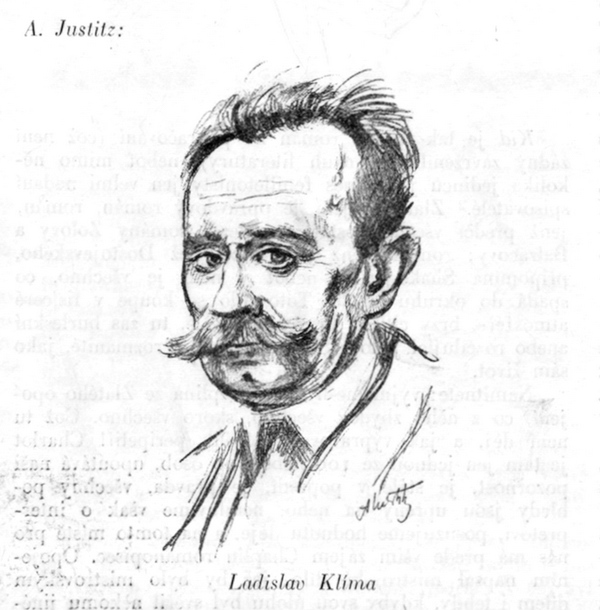
Ladislav Klíma drawn by Alfréd Justitz in 1926.
The Sufferings of Prince Sternenhoch chronices another descent into madness in pursuit of a spiritual ideal, though Sternenhoch eventually “attains salvation through perversion”. Like Karásek ze Lvovic, Klíma explores the paradoxical overlap between mysticism and masochism, but with grim dark humour. The Slavic and East European Journal wrote that it “may transmit the author’s moral nihilism and Nietzschean will to power as well as any treatise. It is a hilarious, provocative, graphic — and at times spectacularly vile — gothic novel, conspicuously rooted in the Decadent milieu that spawned it, but painted in colours more characteristic of the Expressionist and Surrealist movements regnant when it was finally published two decades later.”
Glorious Nemesisis again a colourful vehicle for Klíma’s conceptions of will, freedom, the soul and fate. Again the boundaries between reality and dream states are removed, and again there is a strong ludic element involved in the interplay between the hallucinatory and the philosophical, the transgressive and the numinous. The book itself has a marvellous cover and illustrations by Pavel Rut.
Decadent motifs are also to be found aplenty among the short stories collected and translated by Kathleen Hayes in A World Apart and Other Stories – Czech women writers at the fin de siècle (Karolinum Press, 2001). The title story (1909) by Růžena Jesenská (1863-1940) begins in classic Maupassant style with a conversation in a railway carriage at the Bohemian border, which takes us back Rahmengeschichte-fashion to a previous railway carriage encounter between two ladies, as Marta the chief protagonist sets the tone by slipping almost seemlessly into literary narrative mode: “It was a kind of adventure. That time too the train hurtled into the dark, where red sparks flew and lights flashed, scattering in the mist…”
Teresa Elinson invites Marta to her isolated mansion: “come for a long stay; forever if you like. There only the moon may enter, and the stars, the sun, the quiet clouds and birds”. And so the scene is set for the classic Decadent topos of the lone connoisseur of art and beauty living apart from the world, but urgently seeking companionship and more…
“No, you will not leave me from now on,” she said in a deep voice, as if pleading and commanding at the same time. She pressed my hand firmly and kissed me on the lips.
“How could that be?” I asked timidly.
Teresa sighed thoughtfully: “It’s beautiful to live in a world apart.”
Marta is taken through the manor park to the tomb of Teresa’s last companion. “A metal coffin stood there, with a small lamp flickering above it. On the wall hung a great clock, the ticking of which carried through the tomb like the pounding of a heart…”
The gothic elements are all there, and yet the sense of doom surprisingly dissipates, giving way at the end to a shrug of the shoulder: “For a little while longer we spoke about Teresa Elinson and fell to talking about the strange loves that grip the human heart”.
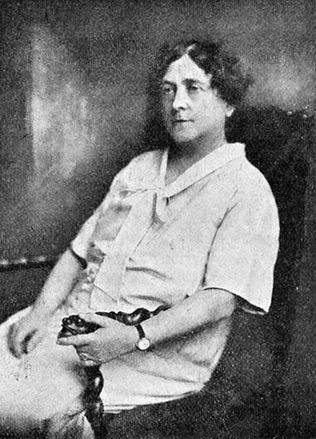
Růžena Jesenská
Other short stories in this collection present the realism and naturalism that were also emerging at that time, along with feminism and various kinds of working-class activism.
Marie Majerová (1882-1967) is a name that elicits a taciturn shudder of recognition from many an older Czech today, but only because in later life she was a member of the communist literary establishment, so her last works were school textbook material. Yet many will also grudgingly concede that she could be a fine insightful and painterly writer, particularly in her anarchist days, and she does have an uncanny knack for getting into the minds of her (often working class) male characters. In this story My Friend, My Brother (1911) a sailor loses his close friend to yellow fever at sea and a prostitute’s questions then send him into a murderous rage. Here the earthy realism takes on a grim naturalism, while the psychological standpoint is retained. Two of her later works were translated into English: Siréna – The Siren – by Iris Urwin, and Havířská balada – Ballad of a Miner – by Roberta Finlayson Samsour.
Gabriela Preissová, (née Sekerová, 1862-1946), was a prose writer and playwright best known to this day in the English-speaking world for the drama Její Pastorkyňa, which served as the basis for Leoš Janáček’s grimly realistic opera Jenůfa. Růžena Svobodová (née Čápová, 1868-1920) was at the heart of Prague literary activities, as she and her husband František Xaver Svoboda ran a salon attended by such Czech luminaries as her lover František Xaver Šalda, Antonín Sova, Vilém Mrštík, František Václav Krejčí, Hana Kvapilová and Božena Benešová, who is also represented in this anthology with a gritty short story portraying insidious anti-Semitism. Svobodová’s short story A Great Passion (1908) provides a fascinating insight into courtship and marriage at that time. There are also stories by Helena Malířová (née Nosková, 1877-1940) and the naturalist Anna Maria Tilschová (1873-1957), who edited women’s journals entitled Nová žena and Lada. Amálie Vrbová (who wrote under the pseudonym Jiří Sumin, 1863-1936) is a feminist who wrote not only harsh realist and naturalist village narratives, but also added elements of horror and the supernatural, and thus moved into the realms of fantasy and even science fiction, e.g. in Povídky skoro neuvěřitelné. Despite coming from a broken home and very straitened circumstances, she taught herself French and German and devoted herself to literature alone in a small provincial town, avoiding the salons of the capital. The story in this collection The Tread of Fate (1912) is the first of her work to be translated into English, but hopefully not the last.
Hence the early part of the century saw some outstanding women‘s writing, but then under the Communists women were expected to sacrifice their ideas for the common cause. As Alfred Thomas writes in his The Bohemian Body: Gender and Sexuality in Modern Czech Culture: “it was only towards the end of the socialist era that women’s writing began to reemerge from the cultural penumbra.” He refers to the growing number of interesting works by women including the co-founder of feminist group New Humanity Alexandra Berková, Tereza Boučková, Jana Červenková, Zuzana Brabcová, Irena Dousková, Daniela Fischerová, Daniela Hodrová, Eda Kriseová, Věra Linhartová, Iva Pekárková and Sylvia Richterová to name just a few. Alas, space does not allow me to pursue this fascinating topic further. Another time perhaps.
Cover image: ‘Triumph der Finsternis’ (1896) by Sascha Schneider, used in the English edition of ‘A Gothic Soul’ published by Twisted Spoon Press. Source: schwulesmuseum.de.
[ ]
Melvyn Clarke is a graduate of the School of Slavonic and Eastern European Studies, where he studied Czech and Slovak language and literature for three years under David Short, Robert Pynsent and Karel Brušák, as well as Central European history. He has translated a broad range of Czech and Slovak texts, including fiction, legal, commercial, marketing, journalistic, advertising and tourist literature. In 1999 he created Czechlist, a very active online translators’ discussion forum.
